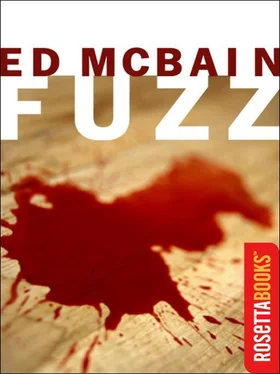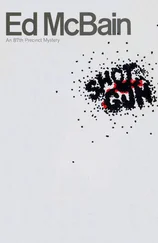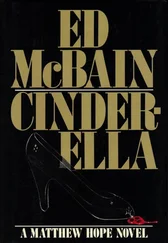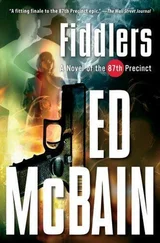Ed Mcbain - Fuzz
Здесь есть возможность читать онлайн «Ed Mcbain - Fuzz» весь текст электронной книги совершенно бесплатно (целиком полную версию без сокращений). В некоторых случаях можно слушать аудио, скачать через торрент в формате fb2 и присутствует краткое содержание. Жанр: Полицейский детектив, на английском языке. Описание произведения, (предисловие) а так же отзывы посетителей доступны на портале библиотеки ЛибКат.
- Название:Fuzz
- Автор:
- Жанр:
- Год:неизвестен
- ISBN:нет данных
- Рейтинг книги:3 / 5. Голосов: 1
-
Избранное:Добавить в избранное
- Отзывы:
-
Ваша оценка:
- 60
- 1
- 2
- 3
- 4
- 5
Fuzz: краткое содержание, описание и аннотация
Предлагаем к чтению аннотацию, описание, краткое содержание или предисловие (зависит от того, что написал сам автор книги «Fuzz»). Если вы не нашли необходимую информацию о книге — напишите в комментариях, мы постараемся отыскать её.
Fuzz — читать онлайн бесплатно полную книгу (весь текст) целиком
Ниже представлен текст книги, разбитый по страницам. Система сохранения места последней прочитанной страницы, позволяет с удобством читать онлайн бесплатно книгу «Fuzz», без необходимости каждый раз заново искать на чём Вы остановились. Поставьте закладку, и сможете в любой момент перейти на страницу, на которой закончили чтение.
Интервал:
Закладка:
Cotton Hawes was almost, but not quite, as cold when he entered the park at nine A.M. that morning. He passed two people on his way to the bench. One of them was an old man in a black overcoat, walking swiftly toward the subway kiosk on Grover Avenue. The other was a girl wearing a mink coat over a long pink nylon nightgown that flapped dizzily about her ankles, walking a white poodle wearing a red wool vest. She smiled at Hawes as he went by with his lunch pail.
The third bench was deserted.
Hawes took a quick look around and then glanced up and out of the park to the row of apartment buildings on Grover Avenue. A thousand windows reflected the early morning sun. Behind any one of those windows, there might have been a man with a pair of binoculars and a clear unobstructed view of the bench. He put the lunch pail on one end of the bench, moved it to the other end, shrugged, and relocated it in the exact center of the bench. He took another look around, feeling really pretty stupid, and then walked out of the park and back to the office. Detective Bert Kling was sitting at his desk, monitoring the walkie-talkie operated by Hal Willis in the park.
“How you doing down there?” Kling asked.
“We’re freezing our asses off,” Willis replied.
“Any action yet?”
“You think anybody’s crazy enough to be out in this weather?” Willis said.
“Cheer up,” Kling said, “I hear the boss is sending you both to Jamaica when this is over.”
“Fat Chance Department,” Willis said. “Hold it!”
There was silence in the squadroom. Hawes and Kling waited. At last, Willis’ voice erupted from the speaker on Kling’s box.
“Just a kid,” Willis said. “Stopped at the bench, looked over the lunch pail, and then left it right where it was.”
“Stay with it,” Kling said.
“We have to stay with it,” Brown’s voice cut in. “We’re frozen solid to this goddamn rock.”
There were people in the park now.
They ventured into the bitch city tentatively, warned by radio and television forecasters, further cautioned by the visual evidence of thermometers outside apartment windows, and the sound of the wind whipping beneath the eaves of old buildings, and the touch of the frigid blast that attacked any exploratory hand thrust outdoors for just an instant before a window slammed quickly shut again. They dressed with no regard to the dictates of fashion, the men wearing ear muffs and bulky mufflers, the women bundled into layers of sweaters and fur-lined boots, wearing woolen scarves to protect their heads and ears, rushing at a quick trot through the park, barely glancing at the bench or the black lunch pail sitting in the center of it. In a city notorious for its indifference, the citizens were more obviously withdrawn now, hurrying past each other without so much as eyes meeting, insulating themselves, becoming tight private cocoons that defied the cold. Speech might have made them more vulnerable, opening the mouth might have released the heat they had been storing up inside, commiseration would never help to diminish the wind that tried to cut them down in the streets, the saberslash wind that blew in off the river and sent newspapers wildly soaring into the air, fedoras wheeling into the gutter. Speech was a precious commodity that cold March day.
In the park, Willis and Brown silently watched the bench.
The painters were in a garrulous mood.
“What have you got going, a stakeout?” the first painter asked.
“Is that what the walkie-talkie’s for?” the second painter asked.
“Is there gonna be a bank holdup?”
“Is that why you’re listening to that thing?”
“Shut up,” Kling said encouragingly.
The painters were on their ladders, slopping apple green paint over everything in sight.
“We painted the D.A.’s office once,” the first painter said.
“They were questioning this kid who stabbed his mother forty-seven times.”
“Forty- seven times.”
“In the belly, the head, the breasts, everyplace.”
“With an icepick.”
“He was guilty as sin.”
“He said he did it to save her from the Martians.”
“A regular bedbug.”
“Forty- seven times.”
“How could that save her from the Martians?” the second painter said.
“Maybe Martians don’t like ladies with icepick holes in them,” the first painter said, and burst out laughing. The second painter guffawed with him. Together, they perched on their ladders, helpless with laughter, limply holding brushes that dripped paint on the newspapers spread on the squadroom floor.
The man entered the park at ten A.M.
He was perhaps twenty-seven years old, with a narrow cold-pinched face, his lips drawn tight against the wind, his eyes watering. He wore a beige car coat, the collar pulled up against the back of his neck, buttoned tight around a green wool muffler at his throat. His hands were in the slash pockets of the coat. He wore brown corduroy trousers, the wale cut diagonally, and brown high-topped workman’s shoes. He came onto the Clinton Street footpath swiftly, without looking either to the right or the left, walked immediately and directly to the third bench on the path, picked up the lunch pail, tucked it under his arm, put his naked hand back into his coat pocket, wheeled abruptly, and was starting out of the park again, when a voice behind him said, “Hold it right there, Mac.”
He turned to see a tall burly Negro wearing what looked like a blue astronaut’s suit. The Negro was holding a big pistol in his right hand. His left hand held a wallet which fell open to reveal a gold and blue shield.
“Police officer,” the Negro said. “We want to talk to you.”
Chapter 2
Miranda-Escobedo sounds like a Mexican bullfighter.
It is not.
It is the police shorthand for two separate Supreme Court decisions. These decisions, together, lay down the ground rules for the interrogation of suspects, and cops find them a supreme pain in the ass. There is not one working cop in the United States who thinks Miranda-Escobedo is a good idea. They are all fine Americans, these cops, and are all very concerned with the rights of the individual in a free society, but they do not like Miranda-Escobedo because they feel it makes their job more difficult. Their job is crime prevention.
Since the cops of the 87th had taken a suspect into custody and intended to question him, Miranda-Escobedo immediately came into play. Captain Frick, who was in charge of the entire precinct, had issued a bulletin to his men shortly after the Supreme Court decision in 1955, a flyer printed on green paper and advising every cop in the precinct, uniformed and plainclothes, on the proper interrogation of criminal suspects. Most of the precinct’s uniformed cops carried the flyer clipped inside their notebooks where it was handy for reference whenever they needed it. The detectives, on the other hand, normally questioned more people than their uniformed colleagues, and had committed the rules to memory. They used them now with easy familiarity, while continuing to look upon them with great distaste.
“In keeping with the Supreme Court decision in Miranda v. Arizona, “ Hal Willis said, “we’re required to advise you of your rights, and that’s what I’m doing now. First, you have the right to remain silent if you choose, do you understand that?”
“I do.”
“Do you also understand that you need not answer any police questions?”
“I do.”
“And do you also understand that if you do answer questions, your answers may be used as evidence against you?”
“Yes, I understand.”
“I must also inform you that you have the right to consult with an attorney before or during police questioning, do you understand that?”
Читать дальшеИнтервал:
Закладка:
Похожие книги на «Fuzz»
Представляем Вашему вниманию похожие книги на «Fuzz» списком для выбора. Мы отобрали схожую по названию и смыслу литературу в надежде предоставить читателям больше вариантов отыскать новые, интересные, ещё непрочитанные произведения.
Обсуждение, отзывы о книге «Fuzz» и просто собственные мнения читателей. Оставьте ваши комментарии, напишите, что Вы думаете о произведении, его смысле или главных героях. Укажите что конкретно понравилось, а что нет, и почему Вы так считаете.












